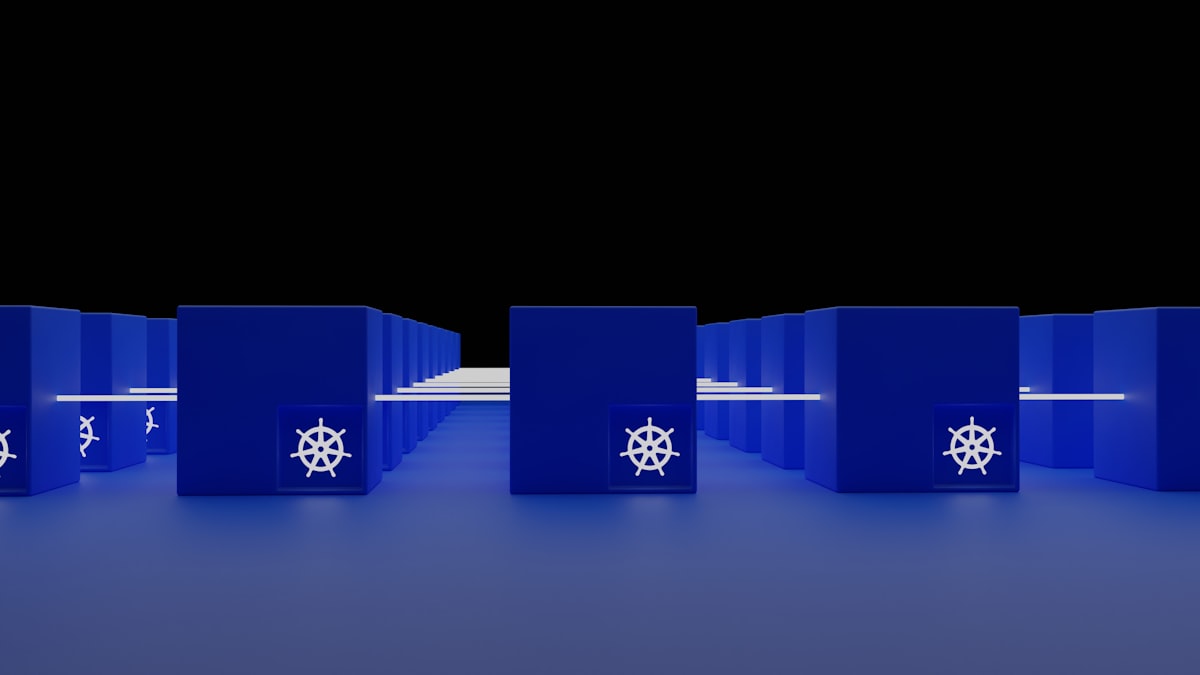Managed Kubernetes Services Perfected for Startups
The Managed Kubernetes Services from the leading organizations in the cloud computing ecosystem have all made huge strides over the past few years, enabling companies to run containerized workloads with cutting-edge open source capabilities.

Kubernetes is an open-source container orchestration solution used to manage your microservices architecture. Managed Kubernetes, also known as Kubernetes as a service (KaaS), is a service provided by third-party providers.
Originally a Google in-house project for its own container orchestration purposes, Kubernetes is now the fastest-growing project in the history of open-source software, after Linux. In 2021, the Cloud Native Computing Foundation (CNCF) published a report that found 5.6 million developers now use Kubernetes [1]. One of the biggest advantages of Kubernetes is that it helps you achieve agile application creation and deployment.
For many organizations, adopting Kubernetes is a significant and beneficial change. The widespread use of Kubernetes among cloud engineering teams means a lower learning curve, making it more profitable for businesses that have complex applications comprising multiple services running in different containers.
However, managing Kubernetes on infrastructure that you administer can be exceedingly complex and time-consuming. You may expose yourself to security flaws if you don't have robust security practices in place. By using a managed Kubernetes service and choosing the best practices to spin up clusters, you can accelerate your path to cloud-native application development and move through the initial stages of implementation rapidly. Managed service providers have promoted this cost-efficient operating model by allowing organizations to focus more on their core business.
This guide compares seven responsible managed Kubernetes providers that are certified through CNCF’s Kubernetes conformance program. Their offerings allow you to free up your engineers for strategic activities and get a full set of analytics on the health of your cluster and services to ensure they stay up-to-date and secure.
Most of these cloud providers offer infrastructure credits for qualifying startups, so experiment and see what works best for your containerized application requirements. Below are the seven best managed Kubernetes services.
This guide compares seven responsible managed Kubernetes providers that are certified through CNCF’s Kubernetes conformance program. Their offerings allow you to free up your engineers for strategic activities and get a full set of analytics on the health of your cluster and services to ensure they stay up-to-date and secure.
Most of these cloud providers offer infrastructure credits for qualifying startups, so experiment and see what works best for your containerized application requirements. Below are the seven best managed Kubernetes services.
DOKS — DigitalOcean Managed Kubernetes
DigitalOcean Managed Kubernetes — DOKS is a managed K8s service that allows you to deploy Kubernetes clusters (with everything pre-installed) without the complexities of handling the control plane and containerized infrastructure. These K8s clusters are compatible with Kubernetes toolchains and integrate easily with DigitalOcean Load Balancers and block storage volumes.
The administration dashboard is intuitive and provides security features to retrieve detailed forensic data to help with investigations into security incidents.
You don't need direct access to instances to deploy Kubernetes because DigitalOcean provides you with managed Kubernetes and databases. It also offers you the ability to deploy pre-configured open source applications to quickly set up your cluster with Kubernetes 1-Click Apps that use the helm package manager.

Is it right for you?
DigitalOcean is a world-leading cloud infrastructure platform that is economical for deploying and managing Kubernetes. You will only pay for the cluster resources that you use and the resources you control, such as Droplets, API usage, associated block storage, and load balancers.
DigitalOcean Kubernetes includes the control plane for free, unlike other providers that charge more than $50 per month. You can reliably run your workloads and remove the one point of failure in Kubernetes with a self-repairing, highly available control plane with an SLA of 99.95%, so you can be confident in your uptime.
DigitalOcean's community is diverse and continues to grow. You will find a substantial body of documentation, tutorials, and guides for Kubernetes, much of which is contributed by open-source enthusiasts.
DOKS — DigitalOcean Managed Kubernetes | Digital Ocean
LKE — Linode Managed Kubernetes
Linode Kubernetes Engine (LKE) is a fully managed container orchestration engine that allows you to run Kubernetes on Linode's powerful infrastructure with ease of use and simple pricing. With LKE, you will be able to effectively use open source resources, work with node pools, and auto-scale clusters in real time to get stable containerized applications.
LKE is a developer-friendly K8s container orchestration service. You can distribute containers across your cluster and get the most out of your resources. The service provides seamless expansion of your cluster so your applications can scale automatically to meet any demand using horizontal cluster auto-scaling.
Linode offers multiple ways to provision a cluster - the service console or the Linode API conveniently allows you to manage node pools. You can create, contract, expand, or upgrade Kubernetes clusters effortlessly and even integrate Kubernetes management with your own infrastructure.

Is it right for you?
LKE offers a pay-as-you-go pricing model — hourly billing for the resources you consume, including Compute Instances, NodeBalancers, and Volumes. The billing rules and billable items depend on the cluster type and the resources you’re using, and there are NO management fees.
Linode delivers Kubernetes along with all the strong open-source ecosystem of Kubernetes tooling needed for production at scale, all supported by the HA Control Plane with a 99.99% SLA. The service includes a free Kubernetes Control Plane, which can be upgraded to high-availability for $60 per cluster per month.
LKE— Linode Managed Kubernetes | Linode
GKE — Google Cloud Kubernetes Engine
Google Cloud Kubernetes Engine — GKE is considered the most advanced managed, production-ready K8s environment for running and scaling containerized applications using Google Cloud infrastructure. GKE is a preferred option for organizations such as Spotify, PayPal, and Twitter because it is mature, easy to use, and packed with advanced cluster management features provided by Google Cloud.
The goal of GKE is to help users trace and understand their Kubernetes applications end-to-end, providing greater visibility into their inner workings, such as auto-scaling, health checks, automatic repair of microservices, integrated logging and monitoring, and private container registries. In addition, it comes with four-way auto-scaling and multi-cluster support, including a high-availability control plane.

Is it right for you?
Kubernetes in Google Labs provides a better experience for managing Kubernetes clusters - after all, Google invented it - and GKE is one of the pioneering cloud services for deploying clusters on GCP.
GKE promotes hybrid cloud models to ensure portability across cloud and on-premise infrastructures. With no vendor lock-in, you are free to migrate your Kubernetes applications and run them anywhere Kubernetes is supported, even in your own data center.
You can drill in deeper with the Google Cloud pricing calculator to estimate your GKE charges, including cluster management fees and the pricing of other resources.
GKE — Google Kubernetes Engine | Google Cloud
Managed Kubernetes — Canonical
Canonical Kubernetes is one of the most sophisticated Kubernetes management systems built from the ground up following best security practices. The platform's 24/7 monitoring is one of its strong suits. Canonical Kubernetes comes with advanced monitoring, observability, alerting, capacity planning, and continuous service checks to ensure your Kubernetes environment and applications stay healthy and secure.
Canonical provides reliable cloud-neutral advice for both private/hybrid operations and offers a multi-cloud operations strategy for mixing and matching workloads for the best mix of latency and price across both fixed and variable workloads.

Is it right for you?
As the publisher of Ubuntu, Canonical offers OpenStack and Kubernetes that are ready for ML/AI-enabled applications. Ubuntu is the best choice for running AI/ML frameworks and is one of the platform's selling points, along with full-stack support and Metal as a Service (MAAS) for managed Kubernetes.
As your managed service provider, Canonical offers the most dependable Kubernetes service to build a vendor-agnostic open-source Kubernetes. The service includes expert-level business consultancy to help achieve your business goals, and the global team of solution engineers provides 24x7 reliable operations.
Canonical Kubernetes is best suited for established companies looking to expand operations without having to build a global team. Their cloud-native approach with Kubernetes provides greater ability and speed for innovation.
Managed Kubernetes — Canonical | Ubuntu
VKE — Vultr Kubernetes Managed Service
Vultr Kubernetes Engine (VKE) is a fully managed service for deploying and scaling containerized applications with predictable pricing. Vultr manages the control plane and worker nodes and provides integration with other managed services such as Load Balancers, Block Storage, and DNS.
Vultr provides a self-managed solution that allows developers to manage the control plane and other components with ease. The service includes Vultr Cloud Controller Manager (CCM), a support tool that connects Vultr features to your Kubernetes cluster for optimizing performance and savings. You can easily monitor the nodes' state and assign their IP addresses.

Is it right for you?
Using VKE does not incur cluster management fees, unlike other platforms. You are charged for the worker nodes and network resources that you deploy and use, including Compute, Worker Nodes, Load Balancers, and Block Storage resources.
The VKE service automatically deploys managed Load Balancers as required for your Kubernetes Load Balancer/Ingress services. It integrates with K8's development tools but does not come with an ingress controller pre-configured. However, Vultr Load balancers will work with any ingress controller, such as Nginx, HAProxy, and Traefik.
Vultr is suitable for developers, startups, and small businesses. Technical support (in-scope) is free, and you can open support tickets for VKE issues or consult the documentation for solutions.
VKE— Vultr Managed Kubernetes | Vultr
AKS — Azure Kubernetes Service
AKS — Azure Kubernetes Service is Microsoft's fully managed container orchestration service for developing and deploying cloud-native apps on the Azure Cloud platform with built-in code-to-cloud pipelines and guardrails.
With AKS, you can prepare containerized applications for production by using Draft for AKS to ready source code and non-containerized applications for deployment to a Kubernetes cluster. Developers can iteratively develop and debug applications with the Kubernetes extensions for VS Code. You can also configure advanced networking, integrate Azure AD, set up monitoring, and other features during the deployment process, and add CI/CD pipelines through GitHub Actions to simplify runtime and portability with Dapr.
AKS provides a user-friendly console that allows you to build, scale, or deploy quickly. You can also auto-scale applications using KEDA — Kubernetes Event Driven Auto-scaler and take advantage of prominent Kubernetes tools and services in Azure Marketplace with one-click deployments to the Kubernetes platform.

Is it right for you?
As a managed Kubernetes service, Azure offers flexible billing models and handles health monitoring and maintenance for free. Since Kubernetes masters are operated by Azure, you only pay for the agent nodes within your clusters, not for the masters. AKS offers no-charge cluster management, so you'll only pay for the instances and the associated resources consumed.
The best way to experience AKS is by trying it out. So go ahead and quickly set up a test deployment strategy to gain observability into your K8s environment. You can detect failures with the K8s resource view, free control-plane telemetry, log aggregation, and container health.
AKS is suitable for startups and enterprise businesses that are building complex applications that use machine learning and big data analytics.
AKS — Azure Kubernetes Service | Microsoft Azure
EKS — Amazon Elastic Kubernetes Service
Amazon Elastic Kubernetes Service (Amazon EKS) is a managed Kubernetes service that makes it easy for anyone to run Kubernetes management infrastructure across multiple AWS availability zones for high availability and to eliminate a single point of failure.
With Amazon EKS, you can leverage all the performance, scale, reliability, and availability of AWS Cloud infrastructure. You can also manage your Kubernetes clusters and applications in hybrid environments and run Kubernetes in your data centers.
Organizations use Amazon EKS to run distributed training jobs with EC2 GPU-powered instances, including Inferentia, and to deploy training and inferences using Kubeflow. Applications running on EKS are fully compatible with existing Kubernetes toolchains and plugins from partners and the K8s community. The service also integrates natively with CloudTrail, IAM, Cloud Map, App Mesh, ELB, and more.

Is it right for you?
Amazon EKS charges $0.10 per hour for each cluster you create. If you use Amazon EKS managed node groups, you pay for the AWS resources (such as EC2 instances, EBS volumes, and Outposts capacity) you create to run your Kubernetes worker nodes. There is no vendor lock-in, no minimum fees, and no upfront commitments.
You can view detailed information on Amazon EKS and architecture costs in a single estimate using the AWS Pricing Calculator.
Amazon Web Services (AWS) is the world's leading cloud provider, used by top companies such as Adobe, Citrix, Coursera, NASA, Netflix, Reddit, and SAP. It is a preferred choice for organizations that already use AWS for other workloads and makes sense to extend their application integration with EKS offering solutions. It is most suitable for companies with open-source talent, such as Kubernetes certified professionals.
Amazon EKS — Amazon Elastic Kubernetes Service | AWS Cloud
Closing Note
These managed Kubernetes providers will help you implement the best security practices without the complexity of managing it yourself. Once your applications are containerized and deployed, you can also set up/integrate Kubernetes Cluster Monitoring with Helm and Prometheus Operator.
If you are curious about learning Kubernetes or cloud engineering, we've got a few practical resources for you:
- CNCF - Kubernetes Certification guide
- New DevOps bootcamps for engineers
- Responsible Cloud Security Certification programs



